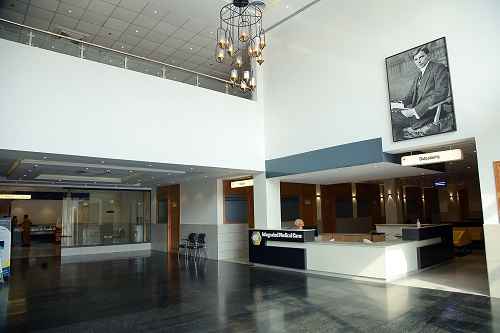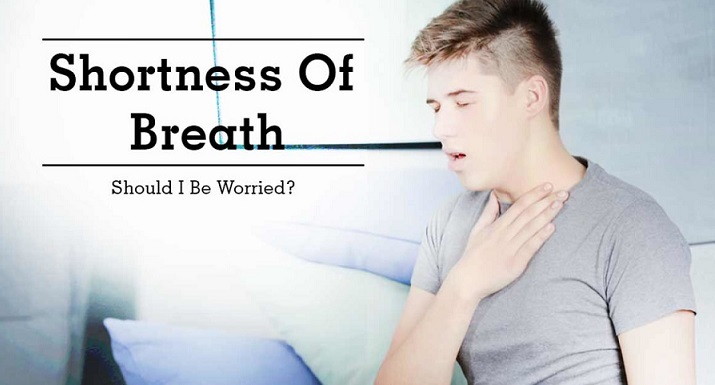- 28-Aug-23
Shortness of breath, also known as dyspnea, is a sensation or feeling of not being able to breathe deeply or easily. It's the perception that you're not getting enough air or oxygen, even when you're trying to breathe normally. This can lead to discomfort, anxiety, and the need to take more frequent or deeper breaths. It's a common symptom that can be caused by various underlying medical conditions or situations, ranging from physical exertion to serious health issues.
Shortness of Breath Meaning in Urdu:
یہ ایسا محسوس ہوتا ہے جیسے آپ اپنی سانس نہیں پکڑ سکتے یا سانس لینے میں دشواری کا سامنا کرنا پڑتا ہے۔ آپ کا دماغ آپ کو بتاتا ہے کہ آپ کے پاس کافی ہوا نہیں ہے یا آپ کا جسم بہت زیادہ ہوا سے بھرا ہوا ہے۔ ایسا محسوس ہوتا ہے کہ آپ آہستہ اور آسانی سے سانس لینے کا طریقہ سیکھ نہیں پا رہے ہیں، یہاں تک کہ جب آپ چھوٹی سانسیں لینے کی کوشش کرتے ہیں۔
Shortness of Breath Causes:
There are several causes of dyspnea or shortness of breath. Among the frequent reasons are:
- Physical Exertion: Intense physical activity or exercise can lead to shortness of breath as the body requires more oxygen to meet increased demands.
- Respiratory Infections: Infections like the flu, cold, bronchitis, or pneumonia can cause inflammation and congestion in the airways, leading to difficulty breathing.
- Asthma: Asthma causes inflammation and narrowing of the airways, making it harder to move air in and out of the lungs.
- Chronic Obstructive Pulmonary Disease (COPD): COPD includes conditions like chronic bronchitis and emphysema, which cause progressive airflow limitation and breathlessness.
- Heart Conditions: Heart failure, heart attack, and heart valve disorders can lead to fluid buildup in the lungs, resulting in breathlessness.
- Anxiety or Panic Attacks: Emotional stress or panic can lead to hyperventilation, causing a sensation of breathlessness.
- Pulmonary Embolism: A blood clot in the lungs can block blood flow, causing sudden shortness of breath.
- Anemia: Low red blood cell levels can lead to reduced oxygen transport and breathlessness.
It's important to note that shortness of breath can be a symptom of both mild and serious conditions, so it's advisable to consult a medical professional for an accurate diagnosis and appropriate treatment if you're experiencing persistent or severe shortness of breath.
Shortness of Breath Symptoms:
Shortness of breath, or dyspnea, is often accompanied by various symptoms that can provide insight into its underlying cause. Common symptoms that might be experienced along with shortness of breath include:
- Rapid Breathing (Tachypnea): Breathing faster than usual, often in an attempt to compensate for the sensation of not getting enough air.
- Chest Tightness: A feeling of pressure or constriction in the chest, which may be associated with difficulty breathing deeply.
- Wheezing: A high-pitched whistling sound when breathing, often indicative of narrowed airways as in asthma or allergies.
- Coughing: A persistent cough, especially if accompanied by phlegm or mucus, can contribute to breathlessness.
- Cyanosis: Bluish discoloration of the skin, lips, or nail beds, which can occur due to decreased oxygen levels in the blood.
- Lightheadedness or Dizziness: Feeling faint or dizzy can accompany shortness of breath, especially during sudden episodes.
- Sweating: Profuse sweating, especially when not exerting yourself, can be a sign of distress.
- Swelling: Swelling in the ankles, legs, or abdomen can indicate fluid buildup due to heart or lung issues.
It's important to remember that the specific combination of symptoms can help medical professionals narrow down the potential causes of shortness of breath. If you or someone else is experiencing sudden and severe shortness of breath accompanied by chest pain, confusion, fainting, or bluish skin, seek immediate medical attention as these could be signs of a serious medical emergency.
Integrated Medical Care Hospital (IMC Hospital):
IMC Hospital is one of the most renowned and talked about medical facilities in Pakistan. The senior, capable, and experienced medical professionals at the IMC Hospital may now benefit from their years of experience working in some of the most prestigious and well-known medical institutions in the world because they are all under one roof. Get in touch with Integrated Medical Care Hospital (IMC Hospital) to schedule a consultation.
Dr. Maaz Suhail Rana
MBBS, MRCP (UK), MRCP (London), SCE Respiratory Medicine (UK).
Specialties: Pulmonology & Intensive Care.
Areas Of Focus: Pulmonary infections, chronic cough, asthma, chronic bronchitis, lung fibrosis, lung involvement in autoimmune disease, respiratory failure and use of non-invasive ventilation, lung cancer, bronchoscopy, ultrasound-guided minimally invasive chest drain insertion, and pleural fluid drainage.
Dr. Javed Hayat Khan
M.B.B.S (Pb), MRCP(UK), FRCP (London), FRCP (Glasgow), FCCP Diploma in Thoracic Medicine (University of London), Consultant Pulmonologist.
Specialties: Pulmonology & Intensive Care.
Areas Of Focus: Management of Chronic Cough, Difficulty of Breathing, Asthma, Pneumonia, Respiratory failure, Oxygen Therapy, Pulmonary Hypertension, and Sleep-Related Breathing Disorders.

 Map
Map










